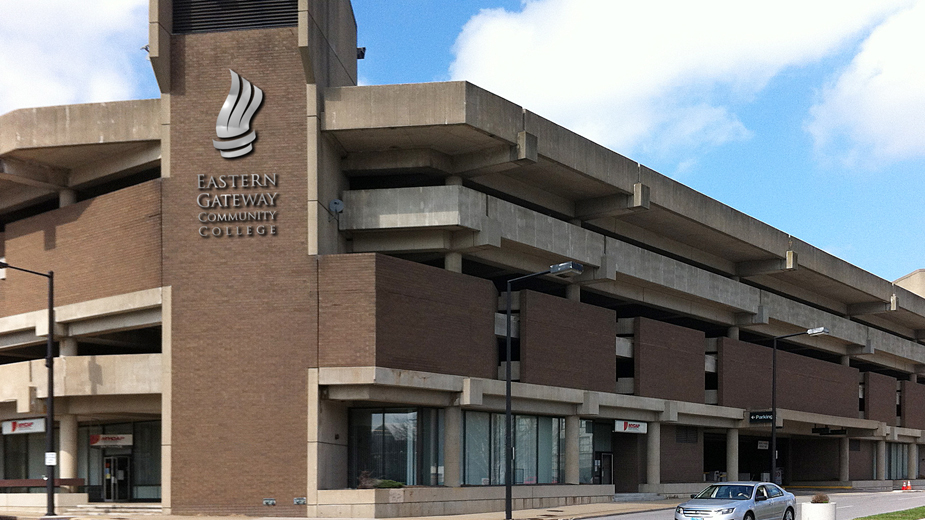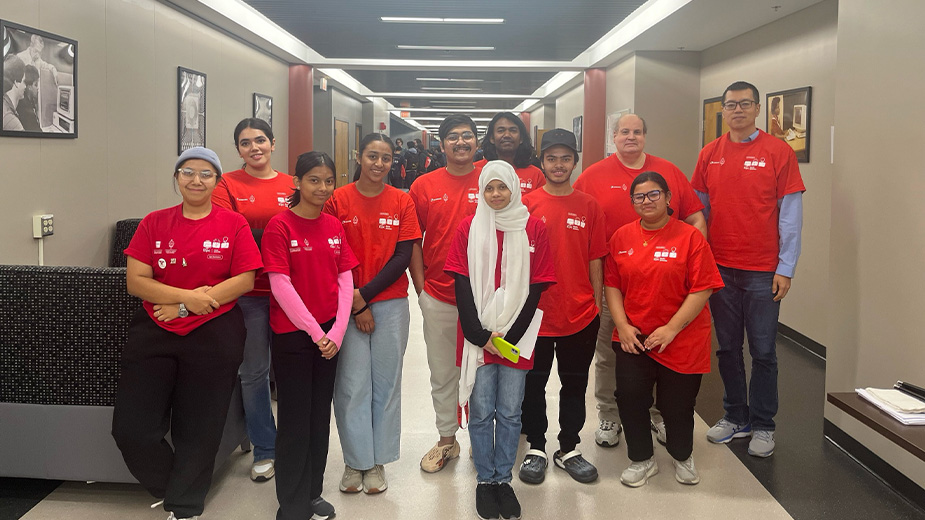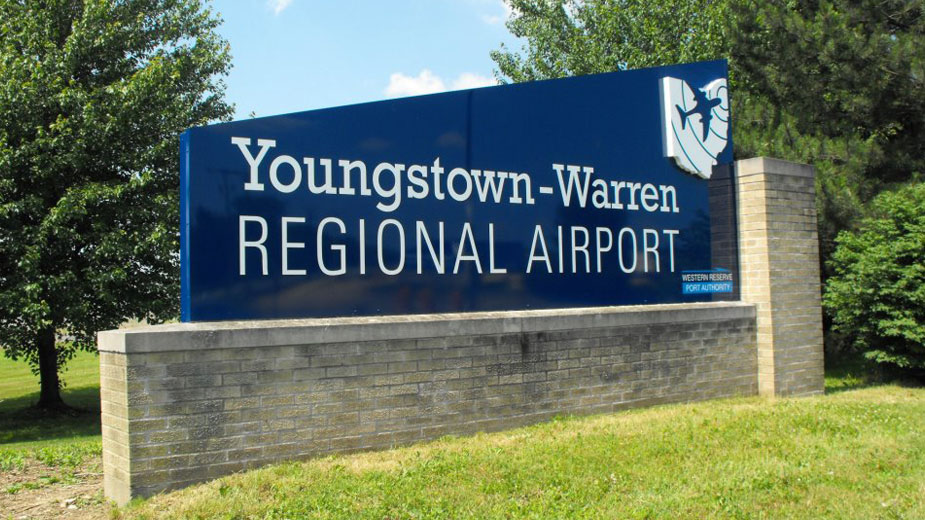Johnson ‘Humbled, Honored’ to Serve as YSU’s 10th President
YOUNGSTOWN, Ohio – U.S. Rep. Bill Johnson will resign from Congress in early 2024 to become the 10th president of Youngstown State University.
Johnson said at a news conference Tuesday that he plans to start at YSU by March 15. He’ll earn $410,000 annually.
The YSU Board of Trustees voted 8-1 to approve his appointment. Molly Seals was the only trustee who voted against it. She declined to comment after the meeting.
The decision was met with boos and shouts of disapproval from many of the students, alumni, faculty, staff, retirees and community members who filled the meeting room. Some turned their backs on the board members to convey their disagreement.
Michael Peterson, chairman of the board of trustees, said the prospectus for the presidential search was compiled with input from hundreds of respondents, including faculty, staff and students.
“The overarching expectations in that prospectus noted first that we wanted a president with unquestionable integrity,” he said.
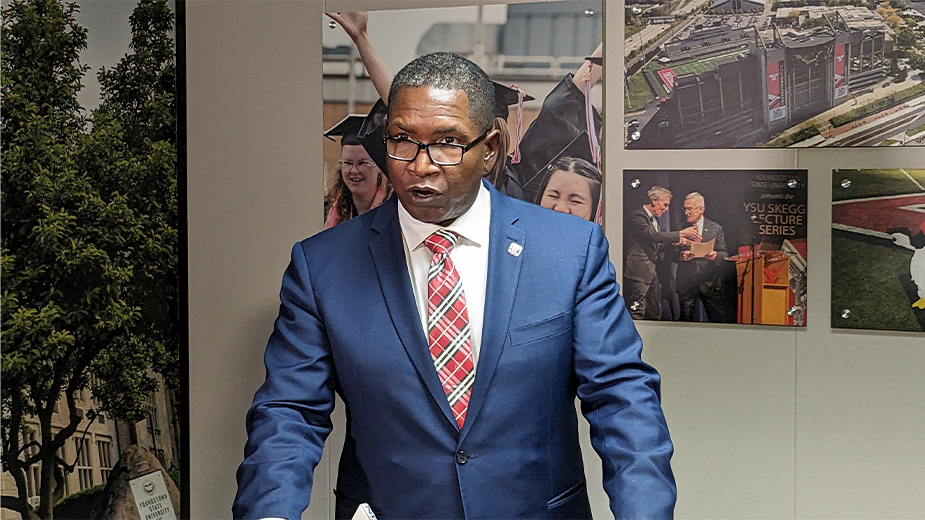
They wanted someone with high energy and passion with a love for Youngstown, Peterson said. Johnson has been a leader in the military, business and Congress, the board chairman said.
He said the board isn’t hiring a politician but a president who must work with every YSU stakeholder, including students, faculty, staff and community partners.
“That’s his charge from the board,” Peterson said. “But he understands that.”
Johnson has demonstrated that he is a servant leader, he continued.
“We posed all of the challenges that people are concerned about to Bill during the interview process,” Peterson said. “He talked in detail about how he would work with the Youngstown State University family to meet those goals and objectives.”
Johnson’s passion for YSU was unmatched by any other candidate, he said.
In response to the protest this week from students, faculty and others about his selection as president, Johnson said he supports people’s right to make their voices heard.
At a news conference after the vote, he said he and his wife, LeeAnn, are “humbled, honored and excited to be joining the YSU family.”
Johnson said he will move into the Pollock House, the presidential residence on campus.
“When I first moved to the Mahoning Valley, I quickly came to admire Youngstown State University and its positive reputation for academic excellence and sports,” he said.
Johnson was first elected to Congress in 2010.
“It’s been a huge honor to be considered and offered this position,” he said. “It fits with my sense of service. Service has been the foundation of my entire career.”
Johnson acknowledged that people have questioned his professional and educational experience.
“As president, my history in politics will not be reflected in the decisions I make for YSU or its students here at Youngstown State,” he said.
He said he’s committed to an inclusive environment at the university, regardless of political or personal affiliations. He said his focus will be on fostering open dialogue, understanding diverse perspectives and contributing positively to the well-being of every student.
Johnson said he looks forward to meeting with different constituencies across campus, and he welcomes open dialogue.
“As the president of Youngstown State University, I will work hard every day to earn the respect and trust of the YSU community,” he said.
Johnson said that students attend YSU to be educated, not indoctrinated or politicized.
“If you look around and you look at the past, you’ll find that every president had their own individual political and ideological views,” he said. “What separates me from them is that I happen to be an elected official.”
Every vote he’s taken over the past decade reflects his values and those of the majority of the people he’s represented, the congressman said.
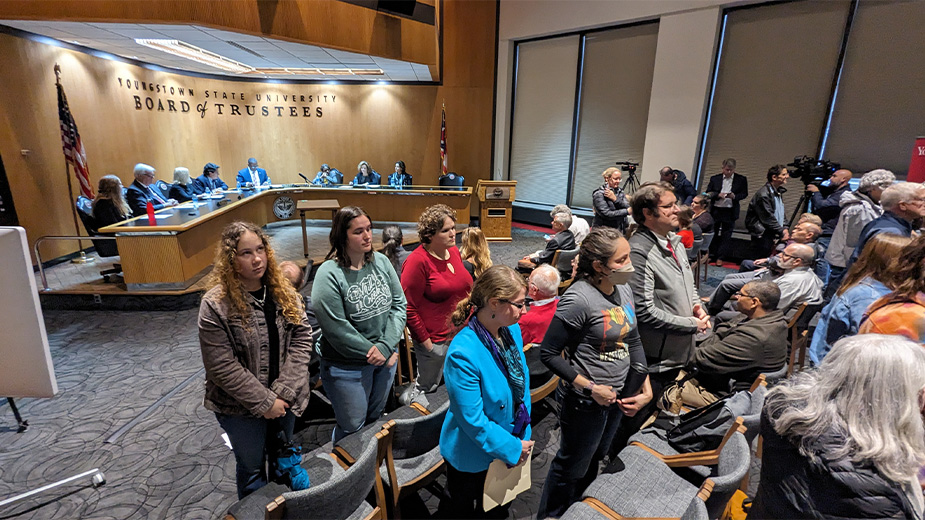
The trustees’ decision angered and disappointed some who attended the meeting. The vote came after an executive session, during which some of those who voiced opposition to either the process used to hire a president or the selection of Johnson were invited to join them.
Mark Vopat, president of the YSU-Ohio Education Association faculty union; Alexander Papa, president of the Student Government Association; and Ashley Orr, a 2016 YSU graduate and the university’s only Rhodes Scholar, spoke individually to the board during the closed-door meeting.
Orr, who, along with four other recent alumni, wrote a petition opposing the decision, said she’s disappointed. “I don’t feel heard,” she said. “I think I feel hurt and uncertain for the future of YSU.”
Many alumni who signed the letter have pledged to withhold donations and service to the university during Johnson’s tenure, Orr said.
About 2,300 individuals signed the letter.
“I am deeply saddened, disappointed, and I know that the YSU community is, the staff, the students, the faculty, the Youngstown community,” she said. “I’m very hopeful that we continue to stand together.”
Much of the criticism about the presidential search and the board vote centered on the process. Unlike past YSU presidential searches, this time the process didn’t involve much of campus.
While a constituent group of YSU administrators and the incoming head of the academic senate participated, finalists didn’t visit campus and meet with faculty, students and staff.
Trustees have said Johnson was one of three finalists for the job, but the university has refused to provide the resumes for the other finalists or others who applied for the job.
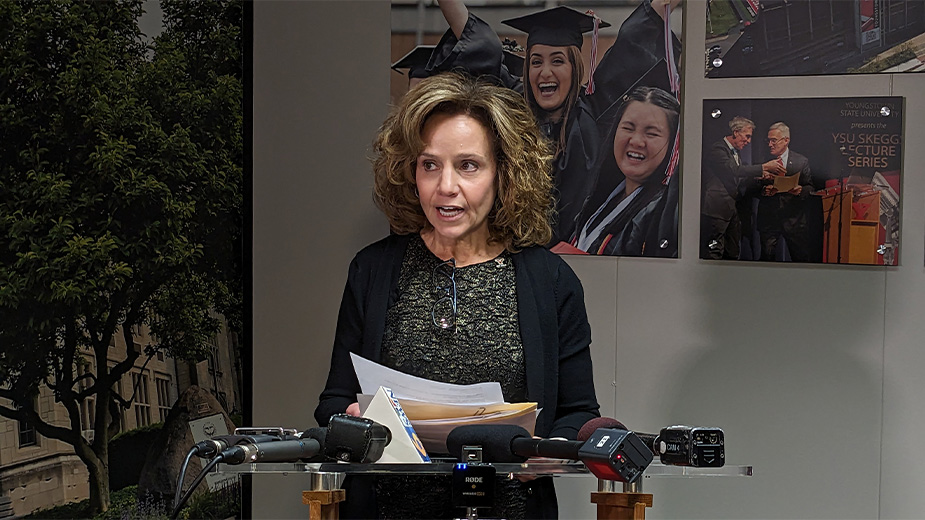
Trustee Anita Hackstedde, who serves as board secretary, said the university didn’t conduct an open search because that would deter the best candidates from applying.
Applying for another position puts their employment at risk, she said. That’s why many public institutions have moved to a confidential process, one that the business world has always used, Hackstedde said.
“That does not mean that we took any shortcuts or failed to follow the law in reaching the decision that we are announcing today,” she said.
Hackstedde said the board complied with all of Ohio’s Sunshine Laws.
However, she said the search committee, which included three trustees, met and interviewed candidates before the list was narrowed to three finalists. Those committee meetings weren’t announced publicly.
Vopat questions the contention that an open process would turn away the best candidates for the position.
“When you get down to the last three, those individuals should be willing to publicly acknowledge that they want the job,” he said. “That seems to me to be a reasonable request.”
Regardless, Vopat said, YSU is a public university.
“We’re not a corporation,” Vopat said. “We’re a nonprofit educational institution. I’m sorry, board of trustees. It’s not like picking a CEO. You have a constituency that should have some say in this.”
He said he’s disappointed in both the board and the process. It shows a lack of respect for all of the constituencies, he said.
“Obviously, there’s opposition to Congressman Johnson,” Vopat said. “That’s understandable because the only thing we know about Congressman Johnson is what he’s publicly said on issues.”
The Vindicator reported this week that three trustees, Joseph Kerola, Richard Fryda and Charles T. George – as well as employees of Kerola and Fryda’s companies – donated to Johnson’s political campaigns. Kerola and George, along with Hackstedde, comprised the presidential search committee. Seals was the alternate.
Johnson, a native of North Carolina, served in the U.S. Air Force, retiring as a lieutenant colonel. He earned a bachelor’s degree from Troy University in Alabama and a master’s degree from Georgia Tech. He started an information-technology consulting company and then worked as the chief information officer for a global manufacturer.
Pictured at top: U.S. Rep. Bill Johnson speaks during a press conference Tuesday.
Copyright 2024 The Business Journal, Youngstown, Ohio.
